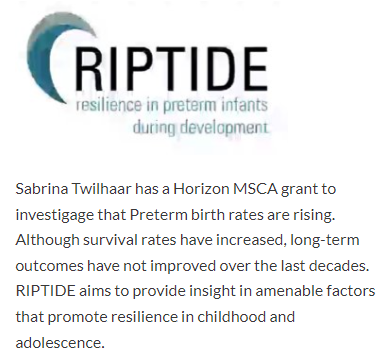Preterm Lifecourse

Warwick Lifecourse & Neonatal Group (WarwickLNG)
Read about the Impact of our Pre-term research
This project was selected by ERC, funded by UKRI


BEST@38 Bayerische Entwicklungsstudie 6Link opens in a new window
The Bavarian Longitudinal Study examines social adjustment and quality of life after preterm birth. The current team are working on Phase 6. December 2024 Newsletter (German) here. Find out more about how the BEST study operates:
R2D2-MHLink opens in a new window
R2D2-MH is a 5-year project that aims to identify risk and resilience factors associated with neurodevelopmental diversity. Through co-creation, R2D2-MH aims to deliver solutions tailored to the needs of neurodivergent people and their families, healthcare givers, clinicians or policy makers.
EPICure StudiesLink opens in a new window
The MRC funded EPICure studies are longitudinal cohort studies of babies born at extremely low gestational ages across the country in 1995 and in 2006. To date, follow up for the cohort has been through to 19 years and to 3 years for the 2006 cohort
RECAP PretermLink opens in a new window
RECAP preterm brings together Europe’s strongest pregnancy, child to adult cohorts and a highly experienced group of organizations and individual researchers.
MoBaEarlyEd
The Norwegian Mother, Father and Child Cohort Study (MoBa) is a study of the causes of disease among mothers and children. MoBa began to recruit pregnant women in 1999. Fathers were also invited. In 2008, the goal of more than 100 000 pregnancies was reached. Biological material and questionnaire data have been collected since the 17th week of pregnancy which makes the study unique.
NIHR – Surviving Crying
Cluster Randomised Controlled Trial of a Service to Support the Mental Health and Coping of Parents with Excessively Crying Infants.
BB2UPLink opens in a new window
The purpose of the Big Baby Trial is to find out if starting labour earlier than usual, at 38 weeks, makes it less likely that shoulder dystocia will happen in women whose babies appear to be bigger than expected.

Sabrina Twilhaar has a Horizon MSCA grant to investigate that Preterm birth rates are rising. Although survival rates have increased, long-term outcomes have not improved over the last decades. RIPTIDE aims to provide insight in amenable factors that promote resilience in childhood and adolescence.
IMPROVE Preterm
Marina Mendonça is part of the IMPROVE Preterm consortium exploring IMPROVing lifElong health and development for children and adults born very PRETERM – observational studies to enhance randomised trials for comparative effectiveness research
Infant2Adult
Neurobiological mechanisms of adverse mental health outcomes following early regulatory problems
A collaboration with the University of Maribor, EMC, University of Tartu, TUM and University of Warwick funded by:










